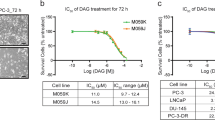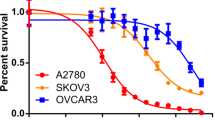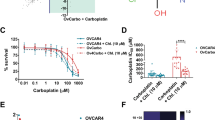Abstract
In order to unravel possible mechanisms of clinical resistance to topoisomerase I inhibitors, we developed a topotecan-resistant human IGROV-1 ovarian cancer cell line, denoted IGROV(T100r), by stepwise increased exposure to topotecan (TPT). The IGROV(T100r) cell line was 29-fold resistant to TPT and strongly cross-resistant to SN-38 (51-fold). However, the IGROV(T100r) showed only threefold resistance to camptothecin (CPT). Remarkably, this cell line was 32-fold resistant to mitoxantrone, whereas no significant cross-resistance against other cytostatic drugs was observed. No differences in topoisomerase I protein levels and catalytic activity as well as topoisomerase I cleavable complex stabilization by CPT in the IGROV-1 and IGROV(T100r) cell lines were observed, indicating that resistance in the IGROV(T100r) cell line was not related to topoisomerase I-related changes. However, resistance in the resistant IGROV(T100r) cell line to TPT and SN-38 was accompanied by decreased accumulation of the drugs to approximately 15% and 36% of that obtained in IGROV-1 respectively. No reduced accumulation was observed for CPT. Notably, accumulation of TPT in the IGROV-1 cell line decreased under energy-deprived conditions, whereas the accumulation in the IGROV(T100r) cell line increased under these energy-deprived conditions. The efflux of TPT at 37 degrees C was very rapid in the IGROV-1 as well as the IGROV(T100r) cell line, resulting in 90% efflux within 20 min. Importantly, the efflux rates of TPT in the IGROV-1 and IGROV(T100r) cell lines were not significantly different and were shown to be independent on P-glycoprotein (P-gp) or multidrug resistance-associated protein (MRP). These results strongly suggest that the resistance of the IGROV(T100r) cell line to TPT and SN-38 is mainly caused by reduced accumulation. The reduced accumulation appears to be mediated by a novel mechanism, probably related to impaired energy-dependent uptake of these topoisomerase I drugs.
This is a preview of subscription content, access via your institution
Access options
Subscribe to this journal
Receive 24 print issues and online access
$259.00 per year
only $10.79 per issue
Buy this article
- Purchase on Springer Link
- Instant access to full article PDF
Prices may be subject to local taxes which are calculated during checkout
Similar content being viewed by others
Author information
Authors and Affiliations
Rights and permissions
About this article
Cite this article
Ma, J., Maliepaard, M., Nooter, K. et al. Reduced cellular accumulation of topotecan: a novel mechanism of resistance in a human ovarian cancer cell line. Br J Cancer 77, 1645–1652 (1998). https://doi.org/10.1038/bjc.1998.270
Issue Date:
DOI: https://doi.org/10.1038/bjc.1998.270
This article is cited by
-
Salvage treatment with topotecan in patients with irinotecan-refractory small cell lung cancer
Cancer Chemotherapy and Pharmacology (2008)
-
ABCG2: determining its relevance in clinical drug resistance
Cancer and Metastasis Reviews (2007)
-
Phase I study of the combination of topotecan and irinotecan in children with refractory solid tumors
Cancer Chemotherapy and Pharmacology (2006)
-
Human Multidrug Resistance Associated Protein 4 Confers Resistance to Camptothecins
Pharmaceutical Research (2005)
-
Membrane transport of camptothecin: facilitation by human P-glycoprotein (ABCB1) and multidrug resistance protein 2 (ABCC2)
BMC Medicine (2004)



